Non-Dairy Milks: Avoid Less-Than-Healthy Choices!
Before you pick up your next carton of non-dairy milk (when you just don’t have time to make your own), be sure you know what to look for so you can avoid those less-than-healthy choices out there. Many product lines sneak some pretty scary stuff into that creamy beverage you drink each day.
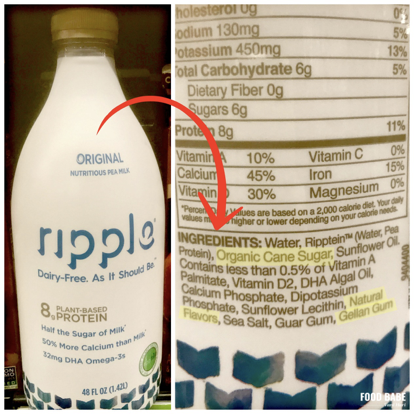
Stuff scary enough to cause digestive upset, blood sugar spikes, and other issues you probably wouldn’t associate with something offered under a “healthy” label. Specifically:
EVAPORATED CANE JUICE, CANE SUGAR, or CANE SYRUP. These sound pretty harmless, right? First, the term “cane” is a red flag. This is code for sugar; it’s not any better for you than white sugar granules or powdered sugar. While it goes through one less step of processing, it’s 99% sucrose (pure sugar), which makes it just as bad for your blood sugar as the sickeningly sweet white stuff you try to avoid.
Truth is, cane sugar contains NO nutritional value. It’s only used to create a smooth texture and overly sweet taste.
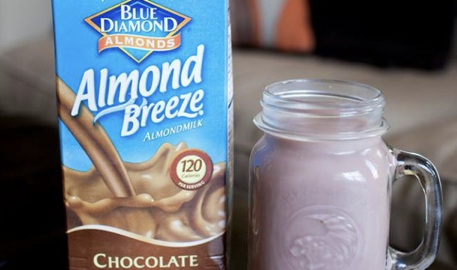
For health’s sake, you want a brand that’s unsweetened. Then, you can add your own healthy sweetener (liquid, alcohol-free stevia, raw coconut nectar, or organic Grade B maple syrup) if you simply must have a sweetener. These are less-refined, lower glycemic, and actually contain benefits that any form of cane sugar does not.
MSG. We all know this crap causes allergies, headaches, and many other health issues, so keep your eyes peeled for this sneaky ingredient! But here’s the thing. You won’t see this specific term on any non-dairy label, so you need to know the food industry’s codes for MSG (that are typically found in non-dairy milks, among a wide range of other foods): “natural flavors” and “natural colors” (unless the product is labeled MSG-free) are the most common. Also, many generic brands of non-dairy milks are showing up, and these typically add MSG as well.
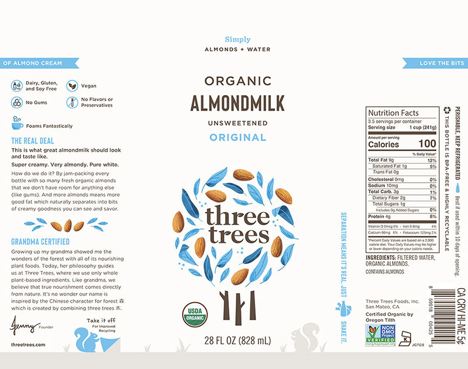
Although brands labeled “organic” is a plus, “MSG-free” and “non-GMO” also mean you’re making a smart choice. Now that you know the code, read your labels and choose wisely.
EMULSIFIERS (XANTHAN, GELLAN GUM, and GUAR GUM). These are also popular emulsifiers added to non-dairy milks. They’ve been linked to digestive problems (colitis and other severe issues) and weight gain. Xanthan gum is a thickening agent made by fermenting a yeast with corn or another sugar source. Gellan gum is produced from bacteria fermentation and is tough to digest. And guar gum comes from a bean plant, and is also very hard to digest.
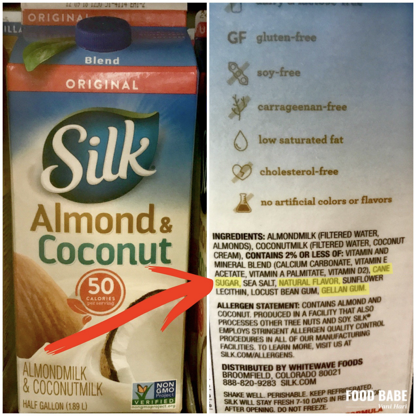
To see what this junk does to your insides, just put them in water. You have to be EXTREMELY careful on the amount because using too much results in a thick goo that’s difficult to stir, much less digest. There are brands that avoid using these (Silk, for instance), however. So here again, read labels to make sure your favorite brand is truly healthy.
GENETICALLY MODIFIED OILS. If you don’t already purchase a brand that’s non-GMO, this will give you reason to do so. Most non-dairy milks are made with some type of oil (in very small amounts). Though these products are very low in fat for the most part, the oil in them should still be taken into consideration.
Canola, safflower and sunflower oil are the most common oils used in non-dairy milks. And they’re also the oils most known to be genetically modified. Therefore, if you purchase non-dairy milk that doesn’t have a non-GMO certification on its label, you are likely ingesting genetically modified ingredients.
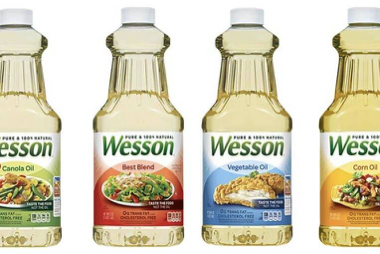
The great news is, for the most part, non-GMO products don’t cost any more than those that do have GMO ingredients. And speaking of ingredients in general: the shorter the list, the more natural (aka healthier) the product. So read your labels, spend your dollars wisely, and sip with confidence!
And one last issue: how about cooking/baking with non-dairy milk? Can it successfully be substituted for cow’s milk? The professional chefs I researched said yes. BUT, they advised that for baked and cooked dishes, it's generally best to stick with unflavored milk, like plain almond milk, instead of vanilla almond milk. And they cautioned against using rice milk, as it is thinner than cow's milk, so it won't give you that creamy texture that many savory dishes are after.
I’ll close this non-dairy milk tutorial with one last bit of research. If you’re curious as to the healthiest non-dairy milks available (typically just 2 or 3 ingredients), the non-profit consumer advocate site, www.ewg.com, can tell you. They list THREE TREES, MALK, ELMHURST, and NUMILK as the safest and healthiest. The hitch, though, is that they’re spendy. I just paid $5.49 for about a quart of Malk and a little more for Elmhurst.
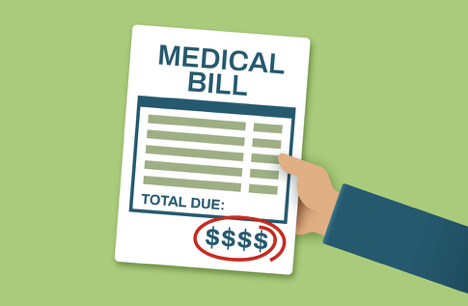
If, like me, you maybe choke at that price, you might ask “What’s my health worth?” I figure it’s a trade-off: health that costs a little more on the front end, or illness that costs a LOT more on the back end.
blog comments powered by Disqus

Stuff scary enough to cause digestive upset, blood sugar spikes, and other issues you probably wouldn’t associate with something offered under a “healthy” label. Specifically:
EVAPORATED CANE JUICE, CANE SUGAR, or CANE SYRUP. These sound pretty harmless, right? First, the term “cane” is a red flag. This is code for sugar; it’s not any better for you than white sugar granules or powdered sugar. While it goes through one less step of processing, it’s 99% sucrose (pure sugar), which makes it just as bad for your blood sugar as the sickeningly sweet white stuff you try to avoid.
Truth is, cane sugar contains NO nutritional value. It’s only used to create a smooth texture and overly sweet taste.

For health’s sake, you want a brand that’s unsweetened. Then, you can add your own healthy sweetener (liquid, alcohol-free stevia, raw coconut nectar, or organic Grade B maple syrup) if you simply must have a sweetener. These are less-refined, lower glycemic, and actually contain benefits that any form of cane sugar does not.
MSG. We all know this crap causes allergies, headaches, and many other health issues, so keep your eyes peeled for this sneaky ingredient! But here’s the thing. You won’t see this specific term on any non-dairy label, so you need to know the food industry’s codes for MSG (that are typically found in non-dairy milks, among a wide range of other foods): “natural flavors” and “natural colors” (unless the product is labeled MSG-free) are the most common. Also, many generic brands of non-dairy milks are showing up, and these typically add MSG as well.

Although brands labeled “organic” is a plus, “MSG-free” and “non-GMO” also mean you’re making a smart choice. Now that you know the code, read your labels and choose wisely.
EMULSIFIERS (XANTHAN, GELLAN GUM, and GUAR GUM). These are also popular emulsifiers added to non-dairy milks. They’ve been linked to digestive problems (colitis and other severe issues) and weight gain. Xanthan gum is a thickening agent made by fermenting a yeast with corn or another sugar source. Gellan gum is produced from bacteria fermentation and is tough to digest. And guar gum comes from a bean plant, and is also very hard to digest.

To see what this junk does to your insides, just put them in water. You have to be EXTREMELY careful on the amount because using too much results in a thick goo that’s difficult to stir, much less digest. There are brands that avoid using these (Silk, for instance), however. So here again, read labels to make sure your favorite brand is truly healthy.
GENETICALLY MODIFIED OILS. If you don’t already purchase a brand that’s non-GMO, this will give you reason to do so. Most non-dairy milks are made with some type of oil (in very small amounts). Though these products are very low in fat for the most part, the oil in them should still be taken into consideration.
Canola, safflower and sunflower oil are the most common oils used in non-dairy milks. And they’re also the oils most known to be genetically modified. Therefore, if you purchase non-dairy milk that doesn’t have a non-GMO certification on its label, you are likely ingesting genetically modified ingredients.

The great news is, for the most part, non-GMO products don’t cost any more than those that do have GMO ingredients. And speaking of ingredients in general: the shorter the list, the more natural (aka healthier) the product. So read your labels, spend your dollars wisely, and sip with confidence!
And one last issue: how about cooking/baking with non-dairy milk? Can it successfully be substituted for cow’s milk? The professional chefs I researched said yes. BUT, they advised that for baked and cooked dishes, it's generally best to stick with unflavored milk, like plain almond milk, instead of vanilla almond milk. And they cautioned against using rice milk, as it is thinner than cow's milk, so it won't give you that creamy texture that many savory dishes are after.
I’ll close this non-dairy milk tutorial with one last bit of research. If you’re curious as to the healthiest non-dairy milks available (typically just 2 or 3 ingredients), the non-profit consumer advocate site, www.ewg.com, can tell you. They list THREE TREES, MALK, ELMHURST, and NUMILK as the safest and healthiest. The hitch, though, is that they’re spendy. I just paid $5.49 for about a quart of Malk and a little more for Elmhurst.

If, like me, you maybe choke at that price, you might ask “What’s my health worth?” I figure it’s a trade-off: health that costs a little more on the front end, or illness that costs a LOT more on the back end.
Sources:
- www.foodbabe.com
- www.foodnavigator-usa.com
- www.geneticliteracyproject.org
- www.imagineeringsf.com
- www.coloniallife.com
 Alice Osborne
Alice Osborne
DVO Newsletter Contributor since 2006
Email the author! alice@dvo.com
